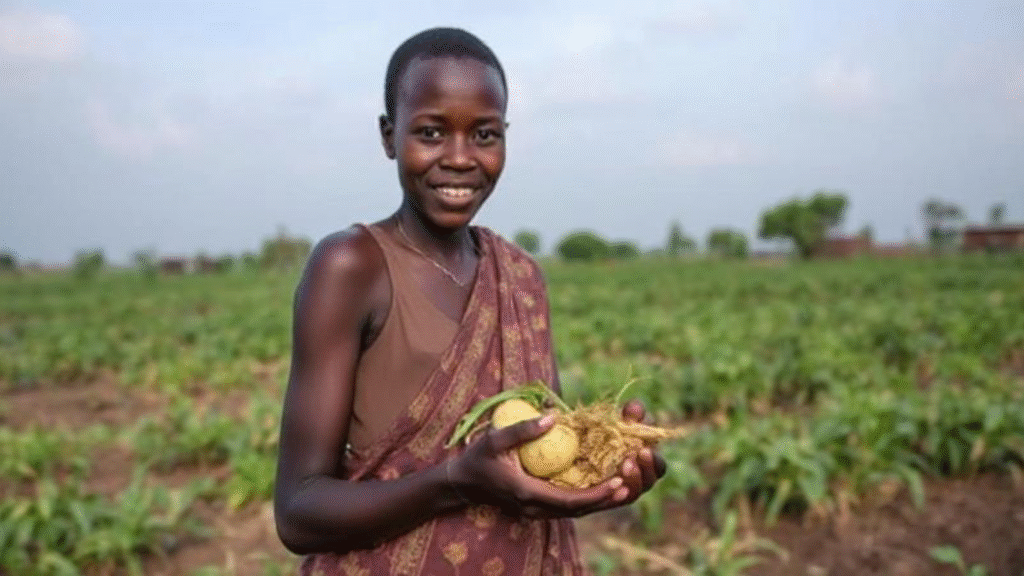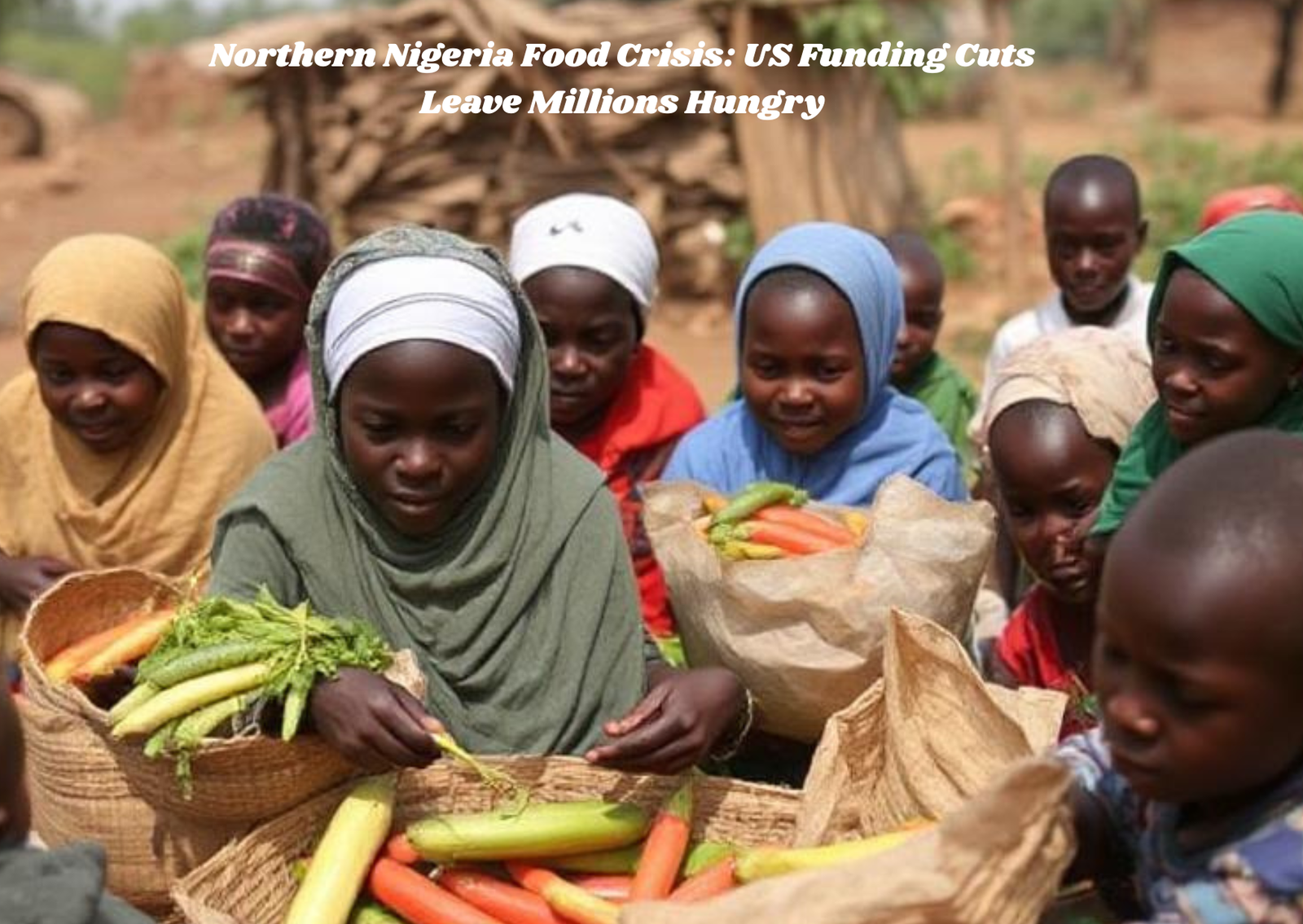Northern Nigeria Food Crisis: Understanding the Human Impact
The Northern Nigeria food crisis has become one of the most urgent humanitarian emergencies of our time. When US funding cuts hit aid groups in 2023–2025, millions of people in Nigeria’s northern states already struggling with poverty, insecurity, and displacement were left with fewer resources to survive.
A woman named Halima, a mother of five in Borno State, shared her story: “For weeks, we received food from aid workers, but now they told us there is no more food.” This is not just her reality; it reflects the suffering of millions. Aid groups like the World Food Programme and UNICEF reported that they had to scale down or suspend programs, leaving vulnerable communities exposed.
This Northern Nigeria food crisis is not just about hunger. It is about women skipping meals so their children can eat, about young girls leaving school to find food, and about families forced to migrate to survive.
Northern Nigeria Food Crisis: Why US Funding Matters
The Northern Nigeria food crisis worsened when US funding cuts reduced the ability of NGOs to deliver aid. For years, the United States was the largest humanitarian donor, contributing hundreds of millions annually. However, as priorities shifted globally, these contributions dropped significantly.

Real-life Example: In Maiduguri, aid workers had to announce to displaced families that their monthly food rations would be reduced by half. Mothers cried, knowing their children would go hungry. One aid group described the experience as “heartbreaking but unavoidable.”
This is why US funding matters without it, essential aid like rice, beans, oil, and emergency nutrition packets cannot reach those in need.
Northern Nigeria Food Crisis: The Role of Women and Children
The Northern Nigeria food crisis disproportionately affects women and children. Studies show that in times of scarcity, women often eat last and least. In northern states, mothers sometimes skip meals for days, while trying to breastfeed or feed their infants.
Real-life Example: In a camp for internally displaced persons (IDPs) in Yobe, a mother named Fatima sold her last piece of jewelry to buy millet. “I had no choice,” she said, “my children were crying of hunger.” This is the devastating reality for thousands of mothers across the region.
Children suffer the most. Malnutrition rates in Nigeria’s northeast have skyrocketed, with thousands at risk of stunted growth or death without urgent support.
Northern Nigeria Food Crisis: How Conflict Makes It Worse
Conflict with armed groups like Boko Haram has intensified the Northern Nigeria food crisis. Many farmers are unable to access their land for fear of attacks. Markets are often closed, and supply chains are disrupted.
Real-life Example: A farmer named Musa fled from his village in Adamawa State after insurgents attacked his farm. Now living in a camp, he said: “Even if aid comes, it is never enough. Before, I could feed my family with my harvest. Now, we wait and hope.”
The combination of violence, displacement, and funding cuts creates a dangerous cycle that leaves families vulnerable.
Northern Nigeria Food Crisis: Global Ripple Effects
The Northern Nigeria food crisis has ripple effects that go beyond the region. Hunger leads to migration, instability, and greater dependence on international aid. Neighboring countries like Niger, Chad, and Cameroon are also struggling with displaced people crossing borders in search of food.
Real-life Example: A report from 2024 showed that some families walked for days across dangerous terrain to reach refugee camps in Cameroon, where aid workers also reported shortages. This crisis is regional, not just Nigerian, and it highlights the importance of consistent funding.
Northern Nigeria Food Crisis: Local Communities Respond
Despite international funding cuts, local Nigerian communities are stepping in. Women’s cooperatives, faith-based groups, and local NGOs are creating food-sharing programs and farming cooperatives.
Real-life Example: In Kano, a group of women farmers pooled their resources to cultivate small plots of land together. They share the harvest equally, ensuring that no family in their group goes entirely without food. These grassroots initiatives show resilience, but they cannot replace the scale of international aid.
Northern Nigeria Food Crisis: Solutions for the Future
Addressing the Northern Nigeria food crisis requires long-term solutions. Humanitarian groups argue that funding must be restored, but beyond that, investment in agriculture, education, and women’s empowerment is critical.
Real-life Example: In Bauchi State, a pilot program trained women in sustainable farming techniques. Within a year, many households had enough food to reduce dependence on aid. Fatima, one of the participants, said: “For the first time, I felt like I could control my family’s future.”
Solutions must combine emergency relief with development programs to break the cycle of dependency.
Northern Nigeria Food Crisis: What the World Can Do
The Northern Nigeria food crisis is not Nigeria’s problem alone it is a global responsibility. Policymakers, donors, and ordinary citizens can all play a role. Supporting humanitarian groups, raising awareness, and pressuring governments to prioritize aid can make a real difference.
Real-life Example: In 2025, Nigerian diaspora communities in the US organized fundraising campaigns, sending resources back home. Their efforts, though small compared to government funding, helped provide school meals for hundreds of children.
This shows that collective action can ease the suffering, even when large-scale funding is uncertain.
Northern Nigeria Food Crisis
| Key Issue | Impact | Real-Life Example | Possible Solution |
|---|---|---|---|
| US Funding Cuts | Millions left without aid | Mothers in Borno told “no more food” | Restore international aid |
| Women & Children | Skipping meals, malnutrition | Fatima sold jewelry to buy food | Targeted nutrition programs |
| Conflict | Farms abandoned, food shortages | Musa fled farm after Boko Haram attack | Invest in peace & security |
| Local Responses | Grassroots farming efforts | Women in Kano share harvests | Support women’s cooperatives |
| Global Role | Migration & instability | Families walk to Cameroon camps | Global fundraising & policy change |
Publish by: Woman One Network | w1network
At Woman One Network (w1network.org), we spotlight the untold stories of women, communities, and global events that shape lives. This feature on the Northern Nigeria food crisis highlights how women and children carry the heaviest burdens during humanitarian emergencies. Our mission is to amplify these voices, connect global readers, and inspire solutions.





Thanks for sharing. I read many of your blog posts, cool, your blog is very good.
Thank you for your sharing. I am worried that I lack creative ideas. It is your article that makes me full of hope. Thank you. But, I have a question, can you help me? https://www.binance.info/register?ref=IXBIAFVY
Your article helped me a lot, is there any more related content? Thanks!